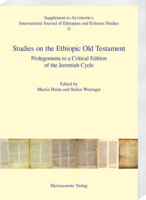|
weitere Titel zum Thema:
Thorough investigations in recent decades have brought to light a relatively large number of ancient manuscripts of the various books of the Old and New Testaments from different parts of Ethiopia. This has led to a renewed interest in up-to-date critical editions of all the books of the Ethiopic Bible. For the Book of Jeremiah, however, there has never been a critical edition. This collection of seven essays marks the beginning of a new endeavour to fill this gap.
Stefan Weninger introduces the reader medias in res, providing a condensed overview of the history of Ethiopic Jeremiah scholarship. Martin Heide’s essay is a sample edition of the Book of Jeremiah based on nearly sixty manuscripts. The data that became available through collation allow to classify the manuscripts and provide first insights into the textual history of the Jeremiah Cycle. Michael Knibb invites the reader to review his experience with the critical edition of the Book of Ezekiel. Furthermore, another essay by him deals with the very intriguing manuscript Leiden Or. 14.692, being probably the earliest Ethiopic manuscript of Ezekiel. Steve Delamarter and Garry Jost introduce the reader to the digital methodology of the Textual History of the Ethiopic Old Testament project, which they apply to a sample chapter of Jeremiah, coming to a similar conclusion – from a different perspective – as Martin Heide. Alessandro Bausi addresses important methodological questions, that is, the status of a reconstruction or whether critical editions of Ethiopic texts should be written in normalized orthography. Finally, Siegfried Kreuzer introduces the reader to an up-to-date view of the textual history of the Septuagint. This enables (and challenges) scholars dealing with textual criticism of Ethiopic Old Testament books to carefully consider the question of the Greek Vorlage. |






